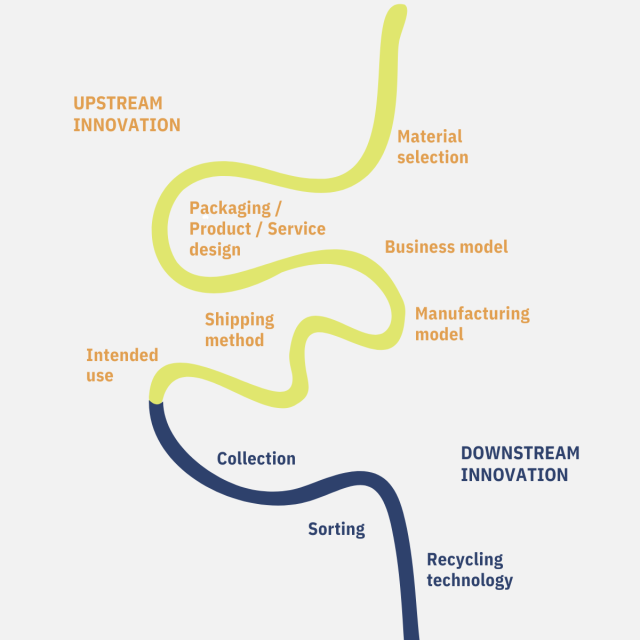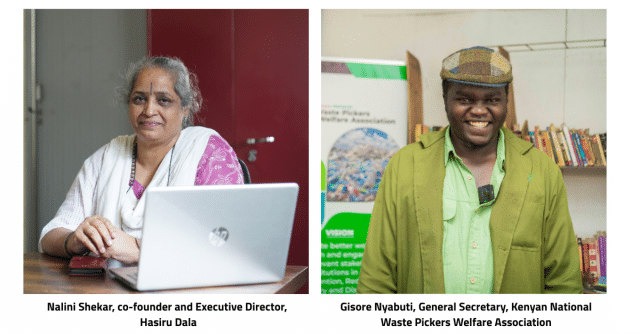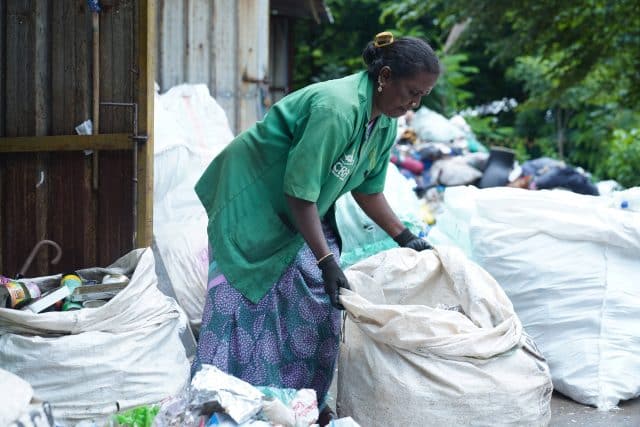Unpacking the economic and health benefits of upstream innovation

Urbanisation is a paradox. While it drives economic growth, innovation, and improved access to jobs and services, it also exacerbates pollution, waste generation, and congestion which weakens public health.
Bengaluru, known as the ‘Garden City,’ experienced a 14 per cent population increase between 2013 and 2023 — nearly double the global growth rate. Meanwhile, Nairobi, the ‘Green City in the Sun,’ has grown from 290,000 people in 1960 to approximately 5 million today.
We visited Bengaluru and Nairobi and spoke with various people involved in our Circular Economy Innovation Clusters to understand the challenges and needs to shift from current waste management systems to upstream innovation – a transition that reflects broader global needs.
Climate KIC and partners GrowthAfrica and SecondMuse, nurture Circular Economy Innovation Clusters in Bengaluru and Nairobi. These are designed to meet local needs across the circular economy landscape by bringing together dynamic, interconnected groups working in waste prevention to tackle systemic challenges at the local level. In this article, we share one of the key learnings from these clusters within the context of global circular economy trends: upstream innovation remains largely untapped.
What is upstream innovation?
Upstream innovation focuses on preventing waste from being created rather than managing it post-use. It represents a fundamental shift in how we approach waste challenges, tackling problems at their source—in design and business model stages. A European Parliament report states that 80 per cent of a product’s environmental impact is determined at the design stage, underscoring why this approach is critical.
Upstream innovation encompasses three key strategies: elimination (removing waste from systems entirely), reuse (designing products for multiple use cycles), and material circulation (ensuring materials maintain their highest value). Intervening before waste is created offers significantly greater economic, social and environmental returns compared to traditional recycling and waste management approaches. True circularity requires going beyond downstream solutions to prioritise waste elimination from the outset.
Source: based on a figure from the Ellen MacArthur Foundation
Population growth drives waste growth
Higher per capita GDP correlates with increased waste generation and Bengaluru alone produces more than 5,000 metric tonnes of waste daily. While the municipality manage 30 per cent of this, private contractors handle the rest. The rapid urban expansion has led over 60 per cent of Nairobi’s population to reside in informal settlements, with many struggling firsthand with waste management challenges.
In both cities, informal waste workers play a crucial role in recycling and repurposing efforts. Nalini Shekar is the co-founder and Executive Director of Hasiru Dala, a social impact organisation focusing on the socio-economic inclusion and empowerment of waste pickers in Bengaluru. She says, “Waste pickers contribute significantly to the economy. For example, a study we conducted showed that because of the work of 15,000 waste pickers, the city of Bangalore saves about 84 crores (840 million rupees/nine million euros) annually in waste collection and transportation costs.”
Likewise, Gisore Nyabuti, the General Secretary for the Kenyan National Waste Pickers Welfare Association paints a similar picture in Nairobi. The association represents over 46,000 waste pickers across the country. He says, “Now, here in the informal settlements, the government doesn’t offer formal services. In Kibera, there are no formal waste collection services, so we, as waste pickers, started doing door-to-door collection. At the moment, we serve 10,000 households in the informal settlement with a team of 288 youths.”
The most vulnerable are at risk
Poorly managed waste poses serious health risks, deepens class divides and reduces recycling efficiency due to contamination. Overcrowded landfills emit methane, contaminate groundwater and cause air pollution, while unmanaged waste attracts pests, increasing disease risks. It is mainly informal waste workers who offer services under precarious conditions that keep the city functioning. But, their services are not equipped to handle both the problem at hand (waste increasing) and the root cause of the problem: eliminating waste completely.
Bengaluru and Nairobi are microcosms of a global challenge
The waste crisis in Bengaluru, Nairobi — and indeed the world — demands systemic changes in governance, production, consumption and community participation to ensure sustainable solutions benefiting the economy and public health. The 2024 International Plastic Treaty negotiations have shown that waste is a global problem but our work with community-based entrepreneurs has shown that local solutions offer opportunities on multiple levels. Strategies like designing waste out of production systems, strengthening policies for informal workers and raising public awareness can shift behaviours. Extended Producer Responsibility (EPR) policies, community-led waste cooperatives and digital tracking systems enhance recycling efficiency and circular systems. Despite growing awareness of these needs, current approaches remain insufficient.
Downstream solutions aren’t enough
As a term, “circular economy” has been published in academia since the late 1980s. However, discussions have largely centred around downstream innovation such as developing new collections, sorting and recycling technologies. As a result of this narrow focus, the global economy is currently only 7 per cent circular and this number continues to decrease. According to the Circularity Gap Report 2024, the volume of discussions, debates and articles around the circular economy tripled from 2018 to 2023, but the share of recycled and reused materials in circulation around the world dropped by 21 per cent in the same period. This information calls on us to rethink our systems, enhance education and invest in entrepreneurs who prioritise minimal waste by design, keeping materials in circulation and regenerating natural systems.
Upstream innovation offers significant economic potential
The Ellen MacArthur Foundation states that urban regions generate over 50 per cent of solid waste. But, where there is waste, there is opportunity. For Bengaluru and Nairobi—and indeed cities worldwide—upstream innovation presents a critical opportunity to address waste challenges at their source while creating economic value.
PwC reports that a circular economy could contribute $624 billion to India’s economy by 2050 while reducing greenhouse gas emissions by 44 per cent. By moving away from the linear “take-make-waste” model, economies can decouple growth from raw material extraction, reducing environmental strain and enhancing economic stability. Circular strategies also promote localisation, minimising reliance on global value chains in general and waste export systems as well as fostering self-sustaining industries.
Next steps: creating enabling ecosystems
The shift from downstream waste management to upstream innovation represents a significant opportunity for cities worldwide. Embracing circular economy principles at the design stage offers a pathway to healthier communities, more equitable economic growth and substantial environmental benefits. As our innovation clusters in Bengaluru and Nairobi demonstrate, realising these benefits requires new approaches to collaboration, policy and business models. In our next article, we share practical examples and key takeaways from how we are navigating these complexities while implementing circular principles within these dynamic ecosystems.
This article is part of a series highlighting our learnings and work across the circular economy and waste management and prevention.
We welcome requests for further insights on upstream innovation and opportunities for collaboration. We are particularly interested in partnerships that can help scale our impact and drive meaningful progress in this space.



